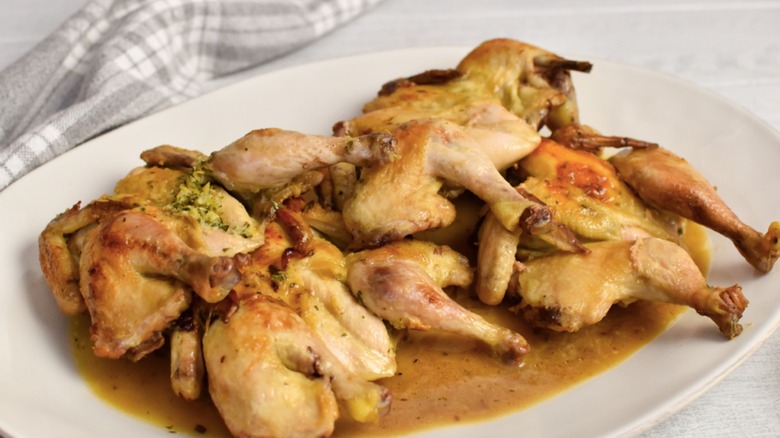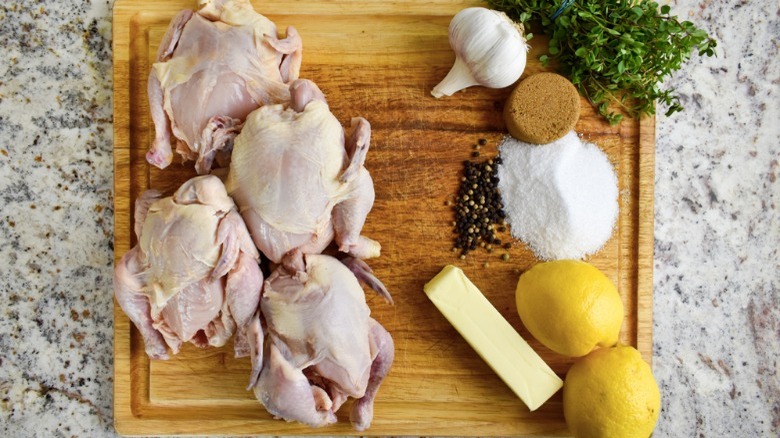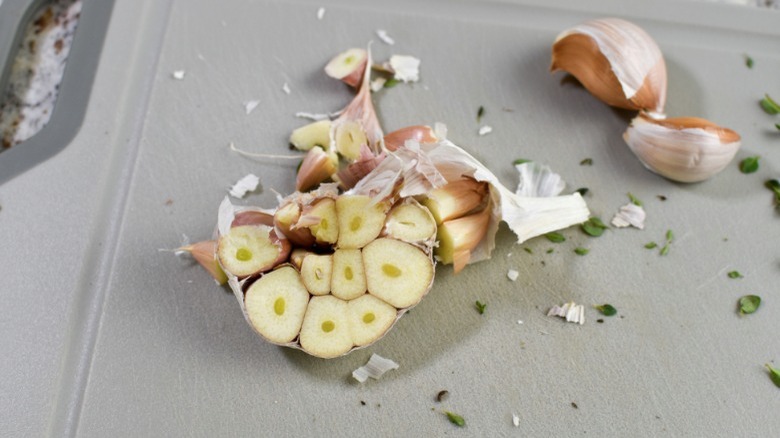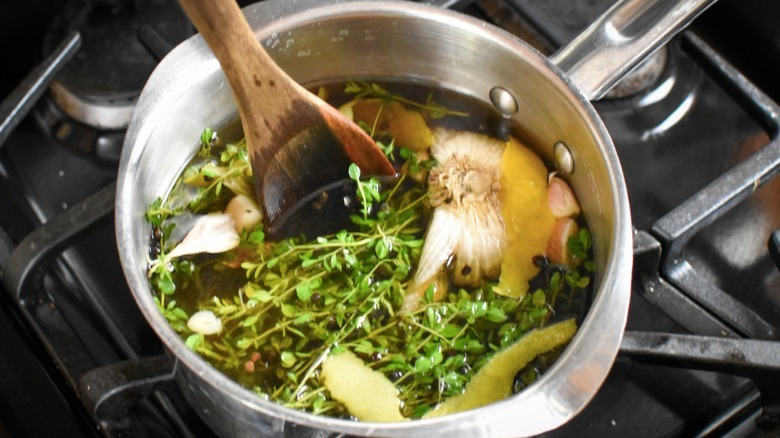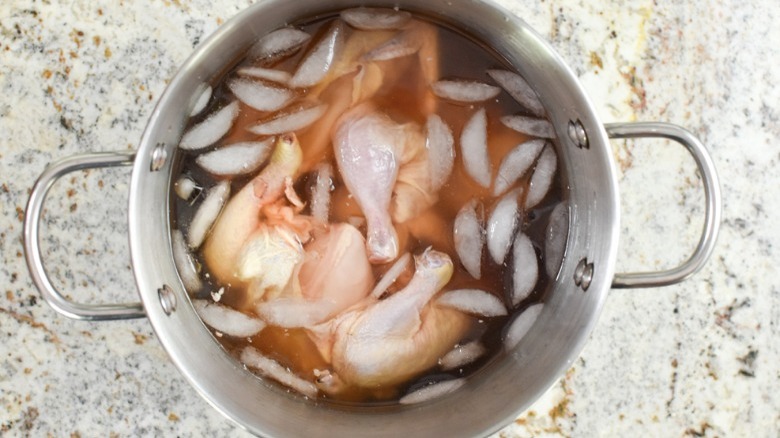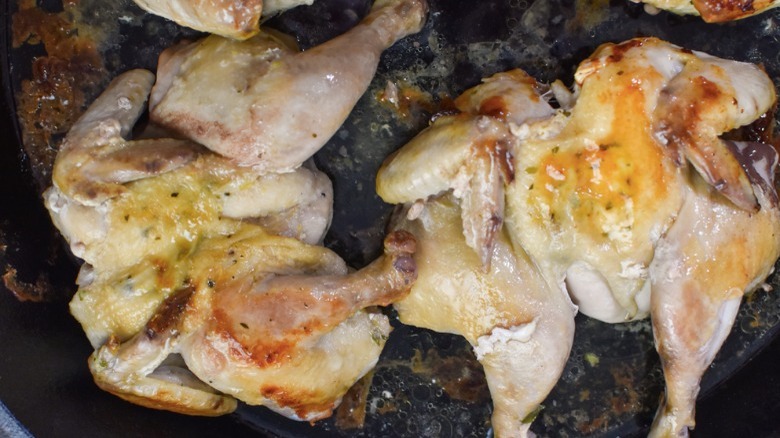Roasted Cornish Game Hens
If you are looking for a new and exciting way to transform your typical roasted chicken dinner, you've come to the right place. Recipe developer Stephanie Rapone brings us this recipe for roasted Cornish game hens.
While not particularly challenging, this recipe is time-intensive, as it involves brining the hens. Additionally, you may only find frozen Cornish game hens at your grocery store, so it's important to plan for the defrosting time when preparing this meal. That said, the time and effort are so worth it. Rapone tells us why she loves this recipe: "I think the magic with this is in the method. Brining makes it flavorful; butterflying makes it cook fast and more evenly; heating the pan and then placing the hens in skin-side down allows you to ... get golden brown skin."
As for how to serve this showstopper? "I love crusty bread, like sourdough, with this to soak up the juices," Rapone says. "It's great with any simple roasted vegetable as well, like broccoli or squash."
Gather your ingredients for roasted Cornish game hens
To make these roasted Cornish game hens, we will start by gathering our ingredients. For this recipe, we will need water, lemons, garlic, thyme, peppercorns, salt, brown sugar, and butter. Oh and, of course, Cornish hens. The serving size is typically 1 per person.
Prep the aromatics
To start, add 4 cups of water to a pot on the stovetop. Bring this to a boil. In the meantime, wash, peel, and zest 1 of the lemons. Peel 3 cloves of garlic and cut the rest of the garlic head in half. Set 4 sprigs of thyme aside.
Create the brine
Add the remaining thyme, lemon zest, halved garlic, and peppercorns to the water. Once boiling, add the salt and brown sugar to the water as well; stir to dissolve. Turn off the heat and pour the brine into an 8-quart pot with 8 cups of cold water.
Butterfly hens and marinade
Now, it's time to butterfly the hens. To do this, use kitchen scissors to cut down both sides of the spine, remove the spine and giblets inside, and discard them (or use to make a stock!). Flip over the hens and press them flat with your hands. Add the hens to the brine and chill in the refrigerator for 2 to 4 hours. Before roasting, remove the hens to a wire rack over a baking sheet to let them dry out completely in a cold spot, uncovered, for at least 1 hour. Use a paper towel to blot dry.
Make the compound butter
Place a large, heavy skillet in the oven and preheat the oven to 425 F. In the meantime, prepare the compound butter by adding the butter, 2 teaspoons lemon zest, chopped leaves from the 4 sprigs of thyme, and 3 reserved garlic cloves (finely chopped) to a small bowl. Use a fork to mash the mixture together.
Once you've made the butter, separate the skin and the meat from the breasts of the hens. Place the butter under the skin. Turn each hen over and spread with more butter.
Roast the hens
Remove the prepared pan from the oven and place the hens skin-side down on the pan. Return to the oven and cook for 20 to 25 minutes, or until the skin is brown. At that point, flip the hens and add ⅓ cup water to the pan to prevent burning. Return the pan to the oven and roast for an additional 10 to 20 minutes, until the hens reach a minimum internal temperature of 165 F. Allow the hens to rest for at least 5 minutes before serving.
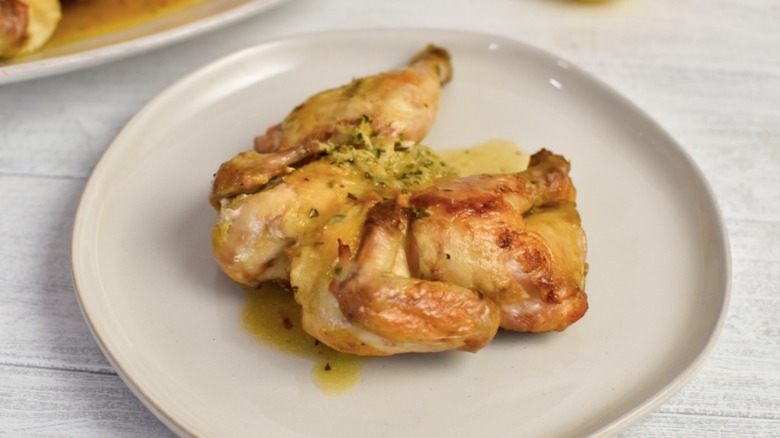
- 12 ⅓ cups water, divided
- 2 lemons
- 1 head fresh garlic
- 1 bunch fresh thyme
- 1 tablespoon whole black peppercorns
- ⅓ cup kosher salt
- ¼ cup brown sugar
- 4 Cornish hens, 22-24 oz each
- 8 tablespoons (1 stick) unsalted butter
- Add 4 cups water to a medium saucepan. Place on the stove over medium-high heat.
- While that's coming to a boil, rinse the lemons. Use a vegetable peeler to remove long strips of zest off of one, being careful not to get too much of the white pith.
- Peel 3 cloves garlic off and set aside. Cut the remainder of the head of garlic in half, along the equator (don't worry if it falls apart). Set aside with the lemon zest.
- Set four sprigs of the thyme aside. Add the rest of the thyme, lemon zest, halved garlic, and peppercorns to the water.
- Once the water comes to a boil, add the salt and brown sugar and stir until dissolved. Turn off the heat. Pour the mixture into a very large pot (big enough to hold 12 cups water and all 4 hens; I recommend at least an 8-quart pot). Add 8 cups cold water.
- Butterfly the hens. If there are giblets on the inside, remove and discard them. Use kitchen shears and start at the neck of the hen. Cut down both sides of the spine to remove the spine. Flip the hen over and open it up, then press down with your palm to flatten the bird out. Repeat with the remaining hens.
- Add the hens to the brine and refrigerate for 2 to 4 hours.
- 1 to 24 hours before roasting, remove the hens from the brine to a wire rack over a rimmed baking sheet. Use paper towels to blot them as dry as possible, especially the skin. Return them to the fridge (uncovered). This allows the skin to dry out so it will brown and crisp.
- When it's time to cook the hens, remove the butter from the fridge and place in a small mixing bowl so it can start to soften.
- Take a large, heavy skillet or rimmed baking sheet and place it in the oven. It needs to be large enough that all four hens can fit in one layer. Preheat the oven to 425 F.
- Zest the second lemon. Measure 2 teaspoons of zest and add to the butter. Strip and chop the leaves from the reserved thyme sprigs, then add them to the butter. Grate or very finely chop the 3 reserved garlic cloves, and add them to the butter. Use a fork to mash it all together.
- Carefully separate the skin on the breast of the hen from the meat. Using your fingers, gently place butter under the skin. Turn the hen over and dot with more butter.
- Once the oven reaches 425 F, remove the hot pan. Place the hens in the pan skin-side down and return to the oven. Roast for 20 to 25 minutes, checking the skin and flipping once it browns. Flip the hens so they are skin-side up. Add ⅓ cup water to the bottom of the pan to prevent the juices from burning.
- Cook for another 10 to 20 minutes, until a thermometer in the inner thigh registers 165 F.
- Allow the hens to rest for 5 to 10 minutes before serving. Whisk the juices in the bottom of the pan and strain out any solids. Serve as a sauce with the hens.
